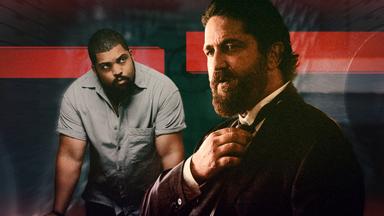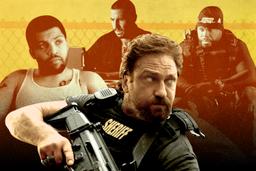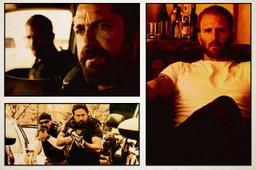The first thing Gerard Butler’s Big Nick O’Brien does after touching down in France early on in Den of Thieves 2: Pantera is sample the local cuisine. “I’ll have a coffee and one of those croissants,” he grumbles, stomping through a French police station in Nice, jet-lagged and even scragglier than usual.
Chances are, if you’re reading this review, on this famously pro-Den-of-Thieves website, you know that our man has already decided that the food here sucks. It also should go without saying, for real Big Nick heads, that he pronounces the hard “t” at the end of croissant. Clenched in Butler’s bear paw–like hands, the flaky treat doesn’t stand a chance.
The pleasure of watching a textbook Ugly American chow down on a French pastry—and also on all the picturesque Cote d’Azur scenery surrounding him on his busman’s holiday—is the heart of Pantera, which follows in the footsteps of many proud (and not-so-proud) franchise sequels by internationalizing its operation. Think Rush Hour 2, or The Equalizer 3, or Rocky IV. Or Police Academy 7: Mission to Moscow. Or, more to the point, think of the Fast & Furious series, whose increasingly globetrotting mandate is the clear model for what’s going on with writer-director Christian Gudegast’s follow-up to his surprise 2018 hit, an endearing bit of Michael Mann cosplay that earned $80 million on a $30 million budget, as well as the undying respect of true believers of Dumpuary everywhere.
The reason that Nick has traveled across the Atlantic is to catch up with Donnie Wilson (O’Shea Jackson Jr.), the former bartender turned wheelman who double-crossed his ruthless criminal boss and checkmated the LAPD’s resident self-described chessmaster (that’d be Nick) before hightailing it out of town with several million dollars’ worth of Federal Reserve money. Nick knows that Donnie is planning another robbery, this one aimed at the World Diamond Exchange in Antwerp (which was hit in real life in 2003 in what journalists called “the heist of the century”). He doesn’t like being had, and, with his marriage in shambles and his kids stranded on the wrong side of a family court ruling, he has nothing to lose by blowing town to avenge his loss (and not much to gain by killing Donnie, either). His ambivalence manifests in a gesture of potential solidarity: “I’m sick of being the hunter,” Nick tells Donnie after getting the drop on him at his rented apartment and making it clear that he isn’t looking for a fight. If you can’t beat ’em, join ’em.
For a guy who already mostly lives on the dark side, Nick’s dereliction of duty is hardly a surprise. If Donnie’s new gang is hesitant to let a former cop into their midst, their skepticism fades once they see what kind of degenerate they’re dealing with: welcomed into a shadowy inner circle of burly, antisocial sociopaths, Nick fits right in. To the extent that Pantera works—and it works pretty well, despite being delayed by a combination of the COVID-19 pandemic and Butler’s busy schedule as Hollywood’s Last Action Hero—it does so by mining the same vein of moral ambiguity as its predecessor, and by doubling down on the tetchy rapport of its returning leads. If it feels at first that Gudegast is taking his sweet time getting the band back together, it’s because the unexpected success of the first film has given him more resources and leeway, as well as more confidence in his slow-burn approach to storytelling, which includes several key sequences executed largely without dialogue or music.
Not that Pantera is trying to be Rififi, or even Ronin; as much fun as it would be to see Gudegast in the Criterion Closet, he’s a fairly no-frills filmmaker (which may be why at least one superlative European auteur likes his work so much). He doesn’t seem interested in crafting beautiful images or submerging subtext between the plot points; the idea that there’s some philosophical bleed through the thin blue line separating good guys and bad guys is hardly fresh thematic territory. What Gudegast is good at is taking a set of durable genre clichés—a crooked cop, an honest thief, a ruthless criminal syndicate, an impregnable underground bank vault—and organizing them into crisp, entertaining configurations, with a welcome minimum of coy self-awareness. The closest thing we get to an in-joke is Nick grinning at Donnie and saying “Fuck the police,” which nods to Jackson’s dad without necessarily denting the fourth wall.
The trade-off for solid craftsmanship is a lack of imagination. For anybody who’s ever seen a movie before, very little that happens during Pantera’s leisurely 144-minute run time will be surprising. The satisfaction lies in the execution, and also in Butler’s performance, which extends the rumpled finesse of his career-best work in the first film. The scene in Den of Thieves in which Nick hugs it out with his ex-wife’s terrified new boyfriend after coming home to sign his divorce papers is a master class in comic menace, punctuated by a great exit line (“Call the fucking cops,” he snarls at the guests in his dining room). The highlight here is a hashish-fueled outdoor club sequence that leans into the character’s shambolic charisma. Butler’s stoned delight as he hits the dance floor in a party-animal ensemble is probably the closest the actor is ever going to come to a Lebowski moment. And while Jackson doesn’t have a comparable showcase, he’s a smart, resourceful actor who does just enough to make it seem like Donnie is in over his head while staring down a horde of stoic, Eastern European tough guys.
One thing that made the first Den of Thieves so enjoyable was its impressively (and consistently) quotable dialogue, which reflected Gudegast’s background as a script doctor (“I didn’t bring my cuffs anyway,” Nick tells a suspect who refuses to be manacled). Pantera keeps the one-liners coming—“Nothing good happens when you’re wearing a suit,” scowls Butler as he prepares for a potential dead-man-walking assignment—but what’s missing overall is the same thing that Donnie used to get one over on Big Nick in the first place: the element of surprise. The decade or so of development hell that shaped Den of Thieves into a better-than-expected thriller resulted in a movie with a certain amount of true grit. The sequel was made with more freedom, more money, and more expectations. It plays, accordingly, like a skillful and slightly cautious exercise in quality control—one designed, quite conspicuously, as a potential bridging chapter within a trilogy.
Provided Pantera does well enough to justify a part three, the next installment could hypothetically take place anywhere, so long as Gudegast doesn’t stray too far from his B-movie sweet spot. Like James Bond, Big Nick O’Brien will return. Hopefully, he’ll finally get sent to a place where he likes the food.





